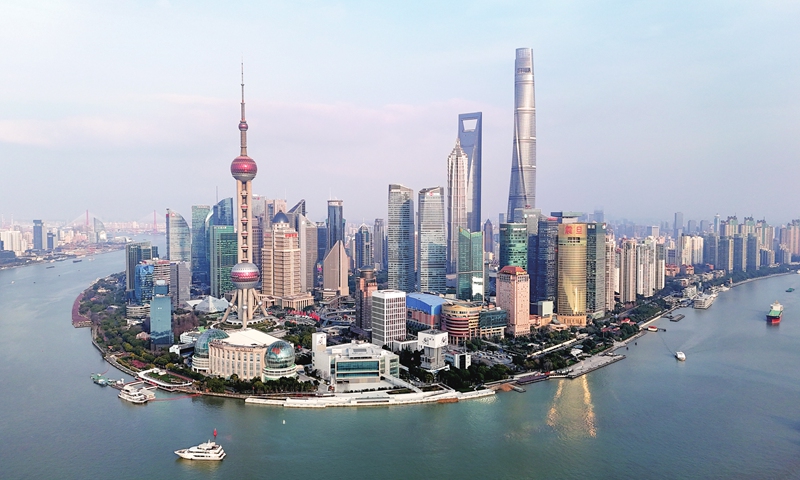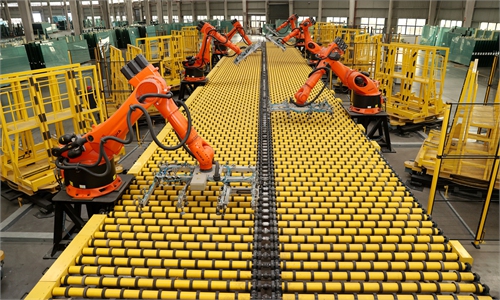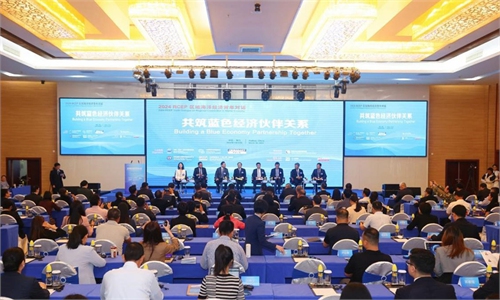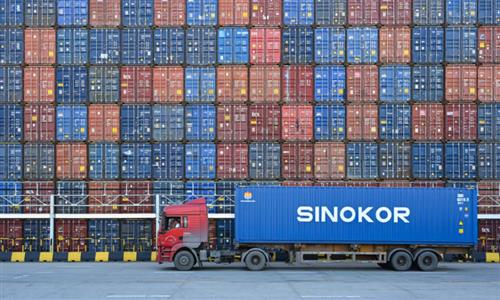Western media’s criticism of China’s new quality productive forces reveals hypocrisy: Canadian scholar


A view of Shanghai's Lujiazui area, a major financial zone in China Photo: VCG
Editor's Note:
Recently, Western media outlets have kept on disparaging the Chinese economy, claiming it is losing steam and it is peaking. The reality is that the Western media lack objective understanding of the economy. Their pessimism about the Chinese economy is excessive. At a symposium on China's Compounding Interest: High-Quality Development and Outlook for 2035 sponsored by Renmin University of China's Chongyang Institute for Financial Studies on Sunday in Beijing, international scholars shared their views on the new phase of the development of the Chinese economy, refuting Western media's "China Declines" narrative.
Observers in China and abroad agree that China has embarked on a new era of structural transformation, or the third phase of national development following the establishment of the People's Republic of China and the commencement of reform and opening-up in late 1970s.
Chinese Premier Li Qiang's Government Work Report put "Striving to modernize the industrial system and developing new quality productive forces at a faster pace" at the top of the list of 10 goals to be achieved, elaborating that "We should give full rein to the leading role of innovation, spur industrial innovation by making innovations in science and technology and press ahead with new industrialization" to foster new growth drivers and promote a new leap forward in the country's productive forces.
The Western media has taken note of the new guiding phrase "new quality productive forces," which illustrates the country is entering a new stage of structural transformation based on homegrown innovation. However, the Western media again criticize China for not prioritizing domestic consumption sufficiently, and allege China is flooding the world with cheap high-tech products. What the Western media really want to achieve is trying to stymie China's growth.
Reducing the investment proportion of China's GDP while merely focusing on consumption will most likely stall China's growth engine. Countries investing considerably less, like most G7 countries, have seen very low growth rates.
And China has always weighted on ramping up domestic consumption, including fostering "new services of greater inclusivity, accessibility and opportunity," to provide greater life satisfaction, family happiness and new consumption patterns of digitally-enhanced culture and tourism. China's rising levels of consumption have also rested on its high investment-powered growth and the trend will remain in the next phase of national growth.
In criticizing China for flooding the market with inexpensive high-tech products, the West is actually complaining that China is contributing to many other countries' development with quality goods at a price considerably lower than the imperialistic and monopolistic West used to charge the developing countries.
This not only exposes the West's hypocrisy in keeping up frenetic talk of the third world's development while engaging in practices that have held it back, it also highlights China's historic role in making the technology that will drive development more accessible.
As for the so-called China's interference in market mechanism, the fact is that those "market-friendly" neoliberal countries are mired in low growths, have become productively weakened and financialized, while China has skillfully combined markets and government regulation and kept markets working for the public good.
The article is based on a speech delivered by Radhika Desai, Professor at the Department of Political Studies of the University of Manitoba, at a recent symposium in Beijing. bizopinion@globaltimes.com.cn



